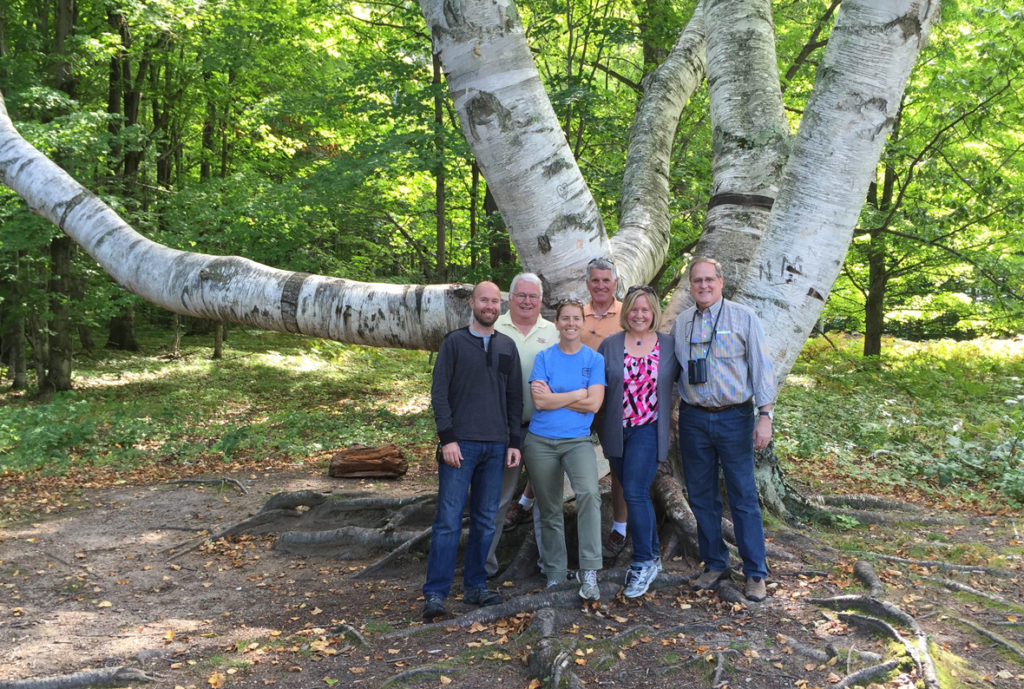Top 5 Things I Learned from Beaver Islanders’ visit to Maine
Beaver Island, Michigan is one of 26 year round island communities in the Great Lakes. It is 32 miles offshore and requires a 2 1/2 hour ferry ride or 15 minute flight in a small plane.
This month, the Island Institute hosted an information exchange with five guests from Beaver Island and two guests from the Michigan Office of the Great Lakes. Prior to their visit, residents of Beaver Island identified five priority areas for their island communities’ sustainability. During their visit, the Beaver Island delegation focused on learning what Maine islands are doing to address these very issues. The list was strikingly familiar to those of us working at the Island Institute: economic diversification (including broadband), K-12 education, marketing/tourism and emergency services.
This collaboration and sharing of information will continue into the spring, when a group of Maine islanders will visit Beaver Island to gain new insights. Although they were here to learn from us in this leg of the exchange, I was amazed at what the experience of having Beaver Islanders visit my island home, Vinalhaven, taught me.
1. Islanders love islands.
As an island resident, I am constantly hosting visitors who are having their first experience with island logistics. During these visits, I often find myself apologizing. I’m sorry that the ferry was late (or not running!); I’m sorry that the store closed so early; I’m sorry that we don’t have any choices for take out tonight. While hosting the Beaver Islanders, I made a startling realization: the things that others find inconvenient, they find comforting. One of the Beaver Islanders walked off the boat on Vinalhaven and said, “Now, this is more like it.” By the end of the day, he had planned a return trip with his family. It’s a fact that islanders like to visit other islands. We ask ourselves, how is it done there? How do we compare? What can we learn? Although each island is different, islanders are naturally at home on islands.
2. Islanders love islanders.
I warned the Beaver Island guests that Mainers were not ‘warm and fuzzy’ like Midwesterners. I told them not to expect too warm of a welcome as outsiders venturing into our community. Boy, was I wrong. As soon as island residents heard that these particular visitors lived on a more remote island than ours, the classic New England freeze melted. They were welcomed, warmly, into homes, businesses and offices. One of the Beaver Islanders found himself in the wheelhouse of the ferry, and inside the back room of the grocery store; places many year rounders have yet to visit. Islanders immediately recognized the shared experience.

Beaver Island School
3. It is so important to see your home through someone else’s eyes.
As an islander, I find myself getting bogged down in the controversy that surrounds so many of our institutions. I worry so much about the school population that I forget what a gift it is to have teachers who truly know and love our students and the benefits to working in small classes. I worry about the sustainability of our medical services and I forget how lucky we are to have trained medical personnel close by and on call 24 hours a day. I get so frustrated by the never ending politics surrounding the town that I forget what a privilege it is to be able to attend a local meeting and have your individual voice and concerns heard. The Beaver Islanders had all of the same concerns, yet I could see from the outside how lucky they were. They were blessed with the same small school, dedicated medical personnel and locally controlled town government. Showing other islanders what we have come to expect forced me to hold a mirror to my own community and appreciate all that we both have.
4. Every island is different, but island politics and pride are universal.
It is very difficult to bring someone from the outside into our community and explain how certain projects have flourished or struggled based on personalities and history. There was no shock or judgment when it was revealed to the Beaver Islanders that a single personality, connection or conflict could change the course of a town, for better or for worse; instead there was a nod of understanding. There was no need to explain the pride that we take in each of our children, even the ones not related to us, and how a successful basketball season or community theater production can change the tone of a winter. I never once had to say, “it’s an island thing.” They simply understood.
5. We have a lot to learn from each other.
From straightforward solutions such as how to best get rid of garbage, to complex issues such as the education around Lyme disease and substance abuse, islanders have a lot to learn from each other. In the four days that we were together, there was a constant exchange of questions, ideas and a shared history. Hours of debriefing with the Beaver Islanders led to rich conversations about the future of all of our communities. These strangers to our island knew us so well and taught us so much in a short period of time. I can only imagine what continued collaboration could bring us.
Exchange trips funded by the Michigan Office of the Great Lakes, Michigan Department of Environmental Quality and The Comer Foundation Fund.


